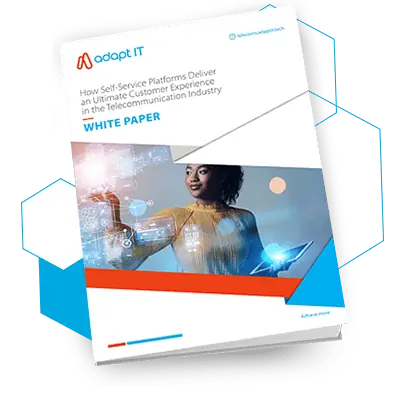Most companies struggle to grasp the concept of the customer experience, and even more so, the Telecoms industry. In fact, Forbes reports that Telecommunications are one of the industries consumers most dislike dealing with.
Table of Contents
ToggleIn addition, a survey by ITWeb shows that people are prepared to pay 16% more for enhanced customer experience.
It, therefore, makes sense for Telecom companies to invest in the customer experience in order to differentiate themselves from their competitors who would not make the effort towards excellence.
Companies that implement a planned customer experience, gain an immediate edge over the rest of the Telecom companies.
Customer service vs. customer experience
The difference between customer service and customer experience is that the first one is reactive while the second, is proactive.
Customer service serves the purpose of attending to issues as they arise: answering queries, giving support, and handling dissatisfaction, while the customer experience is a planned strategy to enhance the customer’s complete journey in every touchpoint over a long period of time.
Customer service can be measured through surveys, while the customer experience requires a more manual, strategic approach based on analytics, user feedback, and root cause analysis.

Importance of a planned customer experience
There’s really just one reason why planned customer experience is key for Telecoms…it separates you from your competitors, and as a result, boosts revenue.
Once such teleco who found this to be true is Vodacom.
Explaining their 6.7% rise in revenue in early 2018, Vodacom Group CEO Shameel Joosub said, “Our strategy of sustained investment into our network and improving customer experience has delivered solid gains in customer numbers in South Africa, and driven growth in our International operations, resulting in stronger growth in group revenue of 6.7%.”
While many other industries have already grasped the importance of strategic customer experience, the Telecom industry has not.
Why?
It’s simple really – Telecom companies consist primarily of technically minded people, and in general, technically-minded people have a one-track mind: they focus on technology and tend to exclude the human factor.
Those who employ dedicated teams to enhance the customer experience and keep improving their processes, gain the edge. This is vital especially today as more ISPs and MVOs pop up.
One such Telco company in South Africa is BitCo which offers business Fibre and VoIP to companies.
BitCo differentiates itself with packages that no one else seems to be offering, for example, all business Fibre packages are uncapped, uncontended, and synchronous. They also take on a more intimate customer approach and have their own in-house technical support team instead of outsourcing the service.
Their customers are happy to pay more for the kind of guarantee they provide around business services.

Negative telecoms customer experiences and causes
Let’s take a look at two negative customer experiences, and give some scrutiny around possible root causes:
Example one
A new client waits for a SIM card and router delivery. The Telecoms company outsources the courier process to a third party. When the courier company arrives for delivery, the client is not at the premises because the courier company failed to contact the client beforehand.
After departing, the courier company sends a message to the client to say that delivery failed and they will contact her again for delivery another time. When the client contacts the courier company directly, she is told that the details are not on the system. She becomes frustrated and eventually shouts at the agent who puts the phone down on her.
Let’s examine the possible root causes of the problem in this scenario:
- There is a disconnect between the Telecoms company and the courier service. Someone experienced needs to be responsible for the relationship between the Telco and courier service. Satisfaction levels regarding the courier service must be measured. The Telco needs to understand that even though the third party is not part of the organisation, any messes they make are the Telco’s problem, as the client won’t differentiate between the Telco and the courier, therefore the Telco looks bad.
- Tight conditions regarding courier services need to be established and managed by the Telco.
- Processes between the two companies need to be evaluated and improved so that clients don’t fall between the cracks.
- It is obvious the courier service agent has not had any customer service training, which is why he simply hung up.
- All possible scenarios need to be catered for. If there’s a problem, the client must be told what to do, not left to her own devices. Factor this into the communication process; give a number or email address the client can use if there is an issue.

Example two
A client creates a social media post telling friends and family about his bad experience with the Telco.
No one from Telco responds to the post. Friends and family who see the post, make comments about how shocking the service is. There is still silence from the Telco.
John, a friend of the client, who happened to be doing his due diligence around telecommunication companies, and considering the services of the complained-about Telco, has abandoned his idea of getting in touch to become a client.
Let’s examine the possible root causes of the problem in this scenario:
No one has been made responsible for social media complaints, so no one has been monitoring social media channels. As such, the Telco is not even aware that their clients are complaining about their poor service. As a result, their reputation is being tarnished, their service remains poor because they are unaware of the amount of dissatisfaction their clients are experiencing, and they’re losing potential and current clients.

What is required from telecoms to ensure good customer experiences
Good customer experiences need to be orchestrated by a person in the Telco who has the ability to put themselves in the shoes of customers.
This person needs to work closely with the CEO in order to drive changes throughout the company.
So the first step is hiring the right person to drive the project. Ideally, the person would not be technically minded, although must be able to work with technical people.
Then have a look at what the data is saying, and perform analysis around trends.
Every operational process needs to be analysed from the client’s perspective and amended in order to improve the entire customer experience.
Once the basic processes have been adjusted where necessary, keep making continual improvements based on analytics and what the data says. You can also incorporate end-user surveys, but they need to be tailored in a way that offers the user a way to express other reasons for dissatisfaction – those the Telecom has not considered. In addition, the information provided by users must be used to drive continual improvements
Most companies struggle to grasp the concept of the customer experience, and even more so, the Telecoms industry. In fact, Forbes reports that Telecommunications are one of the industries consumers most dislike dealing with.
Give Full Control To Your Corporate Customers
Learn how our Corporate Customer Self Service (CCSS) solution allows MNO’s and MVNO’s corporate customers to control their own contracts and alleviate unnecessary support queries in this free white paper

Entrepreneurial Technologist with a proven track record in IT, Infrastructure and Service Management.Strong focus on solution design, implementation and integration, specifically within the mobile data and connectivity landscape.





